Boye Lafayette De Mente - Instant Chinese : How To Express Over 1,000 Different Ideas With Just 100 Key Words And Phrases! (A Mandarin Chinese Language Phrasebook)
Here you can read online Boye Lafayette De Mente - Instant Chinese : How To Express Over 1,000 Different Ideas With Just 100 Key Words And Phrases! (A Mandarin Chinese Language Phrasebook) full text of the book (entire story) in english for free. Download pdf and epub, get meaning, cover and reviews about this ebook. City: North Clarendon, Vermont, year: 2016, publisher: Tuttle Publishing, genre: Detective and thriller. Description of the work, (preface) as well as reviews are available. Best literature library LitArk.com created for fans of good reading and offers a wide selection of genres:
Romance novel
Science fiction
Adventure
Detective
Science
History
Home and family
Prose
Art
Politics
Computer
Non-fiction
Religion
Business
Children
Humor
Choose a favorite category and find really read worthwhile books. Enjoy immersion in the world of imagination, feel the emotions of the characters or learn something new for yourself, make an fascinating discovery.
- Book:Instant Chinese : How To Express Over 1,000 Different Ideas With Just 100 Key Words And Phrases! (A Mandarin Chinese Language Phrasebook)
- Author:
- Publisher:Tuttle Publishing
- Genre:
- Year:2016
- City:North Clarendon, Vermont
- Rating:5 / 5
- Favourites:Add to favourites
- Your mark:
Instant Chinese : How To Express Over 1,000 Different Ideas With Just 100 Key Words And Phrases! (A Mandarin Chinese Language Phrasebook): summary, description and annotation
We offer to read an annotation, description, summary or preface (depends on what the author of the book "Instant Chinese : How To Express Over 1,000 Different Ideas With Just 100 Key Words And Phrases! (A Mandarin Chinese Language Phrasebook)" wrote himself). If you haven't found the necessary information about the book — write in the comments, we will try to find it.
Do you want to speak simple Mandarin Chinese but are too busy to study it? Are you visiting China for a short time and want a Mandarin phrase book to help you communicate in the Chinese language? If so, this Mandarin phrasebook and dictionary is for you. Its tiny 0.4 x 4.1 x 5.9 inches size makes it incredibly convenient to travel with but without losing the most essential content for communication. This new, expanded edition contains 15% more content, fun manga-style illustrations, and additional information on which destinations, personalities and trends are hot in China right now!
The idea of Instant Chinese is simplelearn 100 words and phrases and say 1,000 things. The trick is knowing which 100 words to learn, but the author Boye Lafayette De Mente has solved the problem, choosing only those words youll hear again and again. Even with a vocabulary this small, youll be surprised how quickly and fluently you too can communicate in Mandarin Chinese. Words are repeated in different combinations, building familiarity without effort. All phrases are given in both simplified Chinese characters and standard Hanoi Pinyin romanization. A brief guide to pronunciation allows the user to say the phrases correctly. An EnglishChinese dictionary makes looking up a word or phrase simple and quick. Heres a sample of what youll be able to do with this chinese phasebook:
- Meet people.
- Go shopping.
- Ask directions.
- Ride the subway.
- Order food and drinks.
- And much more.
Boye Lafayette De Mente: author's other books
Who wrote Instant Chinese : How To Express Over 1,000 Different Ideas With Just 100 Key Words And Phrases! (A Mandarin Chinese Language Phrasebook)? Find out the surname, the name of the author of the book and a list of all author's works by series.

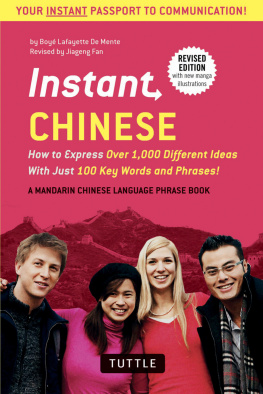
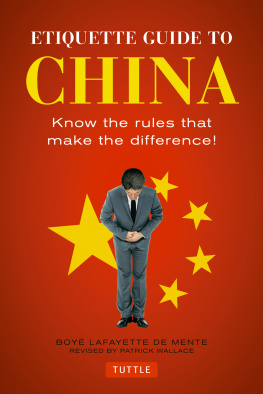
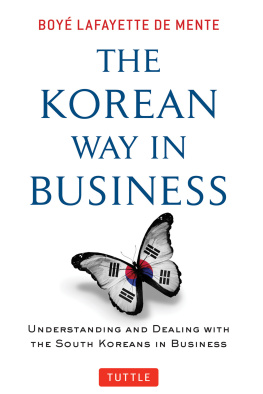
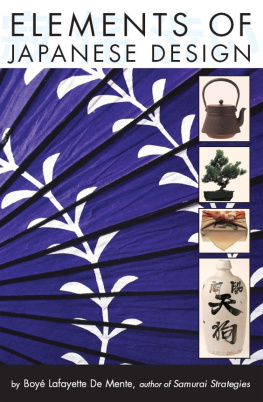
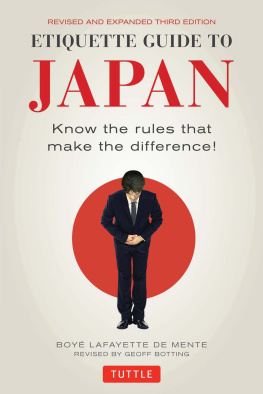
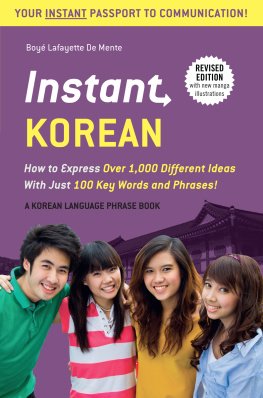
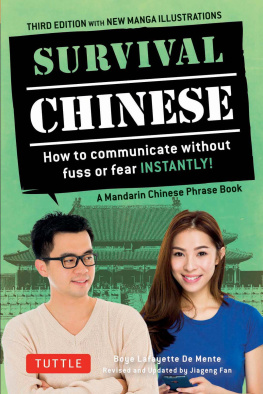
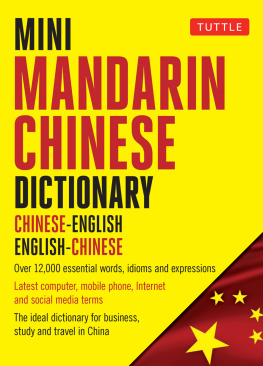
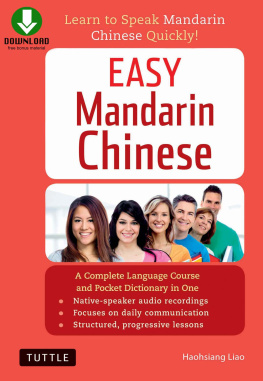
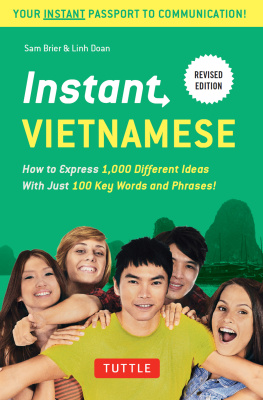
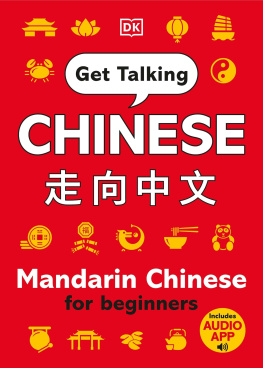
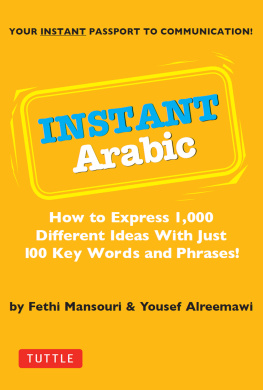
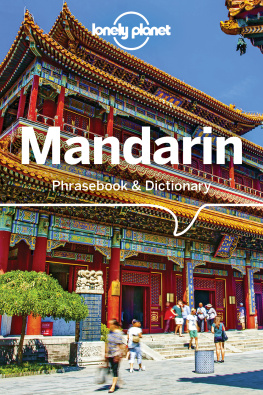

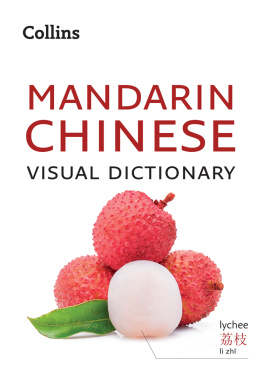
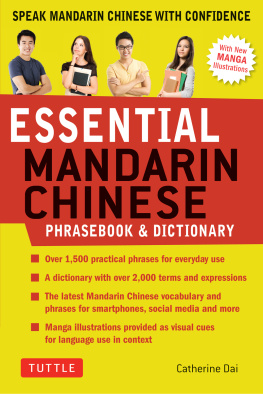
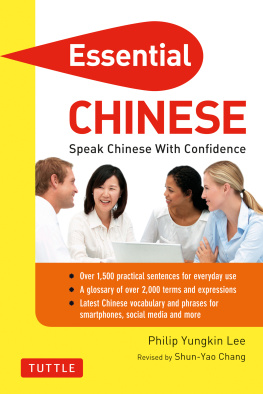
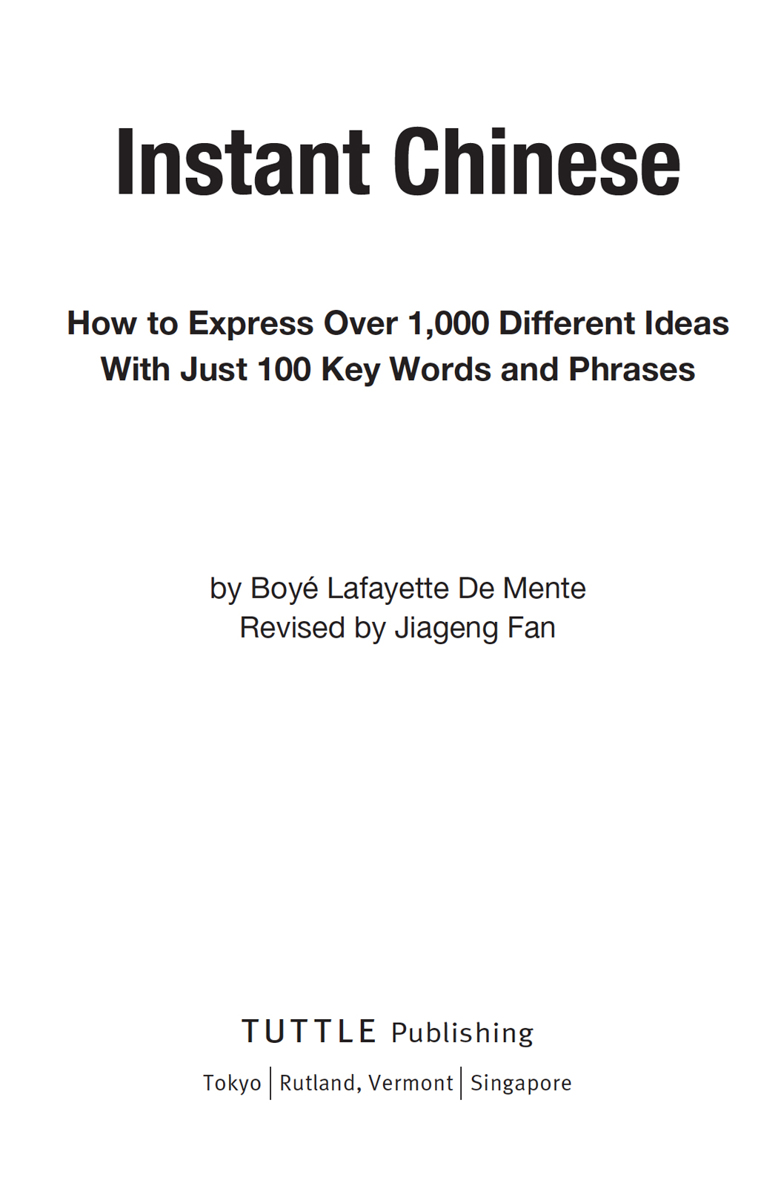 Published by Tuttle Publishing, an imprint of Periplus Editions (HK) Ltd. www.tuttlepublishing.com Copyright 2004, 2015 Boy Lafayette De Mente All rights reserved. No part of this publication may be reproduced or utilized in any form or by any means, electronic or mechanical, including photocopying, recording, or by any information storage and retrieval system, without prior written permission from the publisher. LCC Card No. 2003110054 ISBN 978-0-8048-4537-3
Published by Tuttle Publishing, an imprint of Periplus Editions (HK) Ltd. www.tuttlepublishing.com Copyright 2004, 2015 Boy Lafayette De Mente All rights reserved. No part of this publication may be reproduced or utilized in any form or by any means, electronic or mechanical, including photocopying, recording, or by any information storage and retrieval system, without prior written permission from the publisher. LCC Card No. 2003110054 ISBN 978-0-8048-4537-3
 Part 1
Part 1